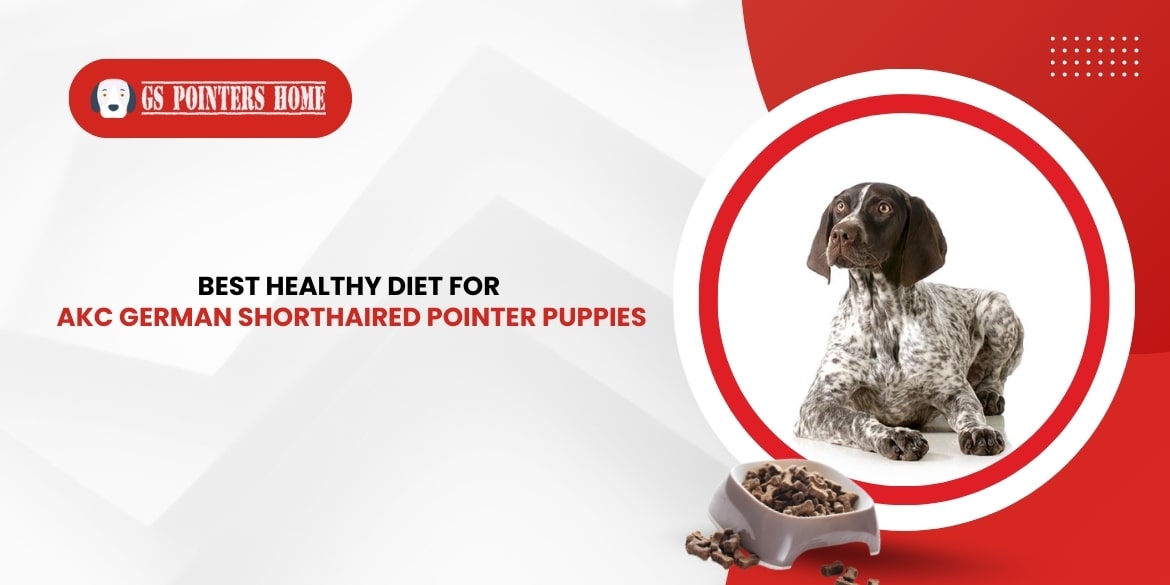Giving your AKC German Shorthaired Pointer Puppies the proper diet is the first step in raising an energetic and active dog. To support their strong bones, high energy levels, and quick growth, these active and strong dogs need a well-balanced diet.
Selecting the right food ensures that your puppy grows into a healthy and happy adult dog.
Nutritional Needs of AKC German Shorthaired Pointer Puppies
Puppies with an active lifestyle, like AKC German Shorthaired Pointer Puppies, have specific nutritional needs. The essential elements listed below should be a part of every well-balanced diet:
1. Protein: A high-quality animal protein is necessary for both general growth and muscle development.
2. Fats: Healthy fats help grow the brain and provide you with energy.
3. Carbohydrates: These aid in maintaining energy levels, but they must come from nutritious sources like whole grains and sweet potatoes.
4. Vitamins and minerals: vital for good skin, strong bones, and general growth.
5. Water: You should always have clean, fresh water available for your puppy to stay hydrated.
Choosing Food for Your AKC German Shorthaired Pointer Puppies
1. Grain-Free vs. Grain-Inclusive Diets
Choosing between a grain-free and grain-inclusive diet is one of the most important decisions you will make when selecting food for your AKC German Shorthaired Pointer Puppies. Some dogs have sensitivities to grains, while others thrive on them.
Sweet potatoes and peas are common carbohydrate sources in grain-free diets, whereas brown rice or muesli are examples of grain-inclusive foods. It’s important to observe your puppy’s digestion and energy levels to figure out what works best for them.
2. Raw Diet (BARF) Biologically Appropriate Raw Food
A raw diet can give dogs nourishment that is pure and unprocessed, much like what they would eat in the wild. Typically, this diet consists of:
- Raw meats such as chicken, beef, and turkey
- Organ meats, including kidney and liver
- Omega-3 fatty acid-rich raw eggs and seafood
- Vegetables such as pumpkin, spinach, and carrots
- Ground bone for calcium
For a balanced food plan, seek advice from a veterinarian if you decide to feed your pet a raw diet.
3. Home-Cooked Meals
You can keep ingredients under control and stay away from preservatives when you cook at home. A well-rounded home-cooked meal could consist of:
- Boiled chicken or beef
- Brown rice or quinoa
- Steamed vegetables
- Omega-3 supplements (fish oil)
Keep your puppy away from dangerous items, including processed meats, chocolate, onions, garlic, and grapes.
Feeding Schedule for AKC German Shorthaired Pointer Puppies
Your puppy will get the appropriate quantity of food at the appropriate time if you follow a feeding schedule:
1. 8-12 weeks: 4 small meals per day
2. 3-6 months: 3 meals per day
3. 6-12 months: 2 meals per day
Maintaining regular food schedules aids in controlling digestion and sustaining energy levels.
Essential Supplements for Growth and Health
The most vital elements are found in premium Dog Food, however, several supplements might improve your puppy’s health:
- Omega-3 fatty acids for brain development and a glossy coat
- Probiotics for digestion and gut health
- Chondroitin and glucosamine for healthy joints
- Phosphorus and calcium for healthy bones
A veterinarian should always be consulted before starting any supplements.
Common Feeding Mistakes to Avoid
1. Overfeeding: This can result in joint problems and obesity.
2. Free-feeding: If food is continually available, puppies may overeat.
3. Sudden diet changes: This can result in stomach problems; always make the change gradually.
4. Feeding human food: For dogs, certain human foods can be poisonous.
Final Words
The secret to growing a healthy AKC German Shorthaired Pointer Puppies is to provide them with the proper diet. A balanced combination of fat, proteins, vitamins, and minerals should be given to your puppy regardless of whether you feed them homemade meals, premium commercial food, or a raw diet.
A carefully thought-out feeding schedule and a healthy diet can help your dog develop into a strong and active friend. For additional professional advice on how to take care of your AKC German Shorthaired Pointer Puppies, contact GS Pointers Home.
FAQs
1. What is the best diet for a German Shorthaired Pointer?
Ans. Their general well-being, energy levels, and muscular health are supported by a high-protein diet that includes lean meats, healthy fats, and complex carbohydrates.
2. What is the best homemade food for puppies?
Ans. Important nutrients that support strong immunity, good growth, and digestion are found in boiled chicken, rice, sweet potatoes, carrots, and eggs.
3. What is the digestive problem with German Shorthaired Pointers?
Ans. They need easily digested food, smaller meals, and enough water because they are prone to bloating, food allergies, and sensitive stomachs.
4. What are German Shorthaired Pointers best at?
Ans. Their great activity, intelligence, and keen sense of smell enable them to perform well in endurance sports, hunting, agility, and obedience.
5. How to care for a German Shorthaired Pointer?
Ans. Daily exercise, mental stimulation, a healthy diet, grooming, veterinary examinations, and good training are all necessary for a happy and healthy life.

